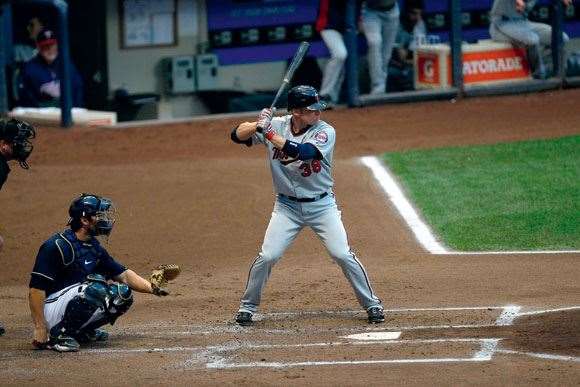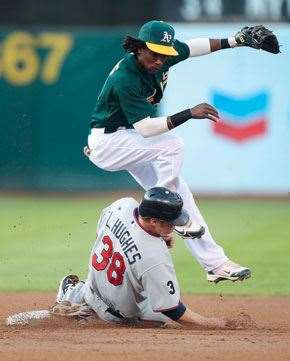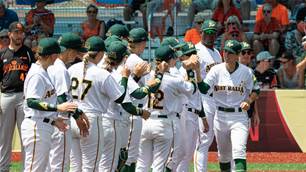The Western Australia-born dynamo has just finished his second season in Major League Baseball for the Minnesota Twins, where he ground through a 162-game campaign …
The Western Australia-born dynamo has just finished his second season in Major League Baseball for the Minnesota Twins, where he ground through a 162-game campaign …
Our winter footballers continue to cool their heels after “marathon” seasons of 20-plus games, spare a thought for Luke Hughes. The Western Australia-born dynamo has just finished his second season in Major League Baseball for the Minnesota Twins, where he – like everyone else in The Show – ground through a 162-game campaign … Actually, don’t spare a thought for the first baseman; there’s nothing else he’d rather be doing than slugging sliders and curve balls over the fence and into the delirious crowds of the majors.
 photos by Getty Images
photos by Getty ImagesFor the past nine years Hughes has strutted his stuff for various teams in the Twins’ feeder system, always returning home to provide his beloved Perth Heat with much-needed hitting support. After an arduous campaign with the Twins in the majors, he’s likely to turn out again for the Heat this year (probably for the second half of their Australian Baseball League season, after a decent rest, of course). This commitment speaks volumes of his passion for growing the game Down Under and his desire to give back to a sporting fraternity which has helped deliver him such opportunities as playing in front of packed houses at Yankee Stadium and Boston’s Fenway Park.
With the MLB play-offs in full swing and the first pitch of the revamped ABL’s second season to be thrown by defending champions Perth to runners-up the Adelaide Bite on November 3, Inside Sport thought who better to ask about life as an aspiring pro turned majors regular than Australia’s own Luke Hughes.
DANCING WITH THE STARS
“I’ve played against and with some of the most unbelievably talented baseball players to ever step foot on a field. I played with guys like Jim Thome this year, who’s going to be a Hall of Famer; Justin Morneau and Joe Mauer are a couple of guys at the Twins who are awesome players. And then to go out on the field and play against the Yankees ... You know, the best team in baseball; the big money guys ‒ Derek Jeter, Alex Rodriguez. It’s been a great experience to get out there and talk to them on the field and joke around with them.”
TALKING THE TALK
“You get to talk to the players when they reach first base. You always say “G’day” and they always ask the question: “Are you from Australia?” They’ve always got a story; it might be about someone they’ve played with or against in the minors who was from Australia. It’s quite funny standing there having conversations with guys you grew up idolising. You realise they’re just normal blokes. They’ve obviously been around the game a lot longer ‒ some for 15-to-20 years ‒ and they’ve seen it all.”
 photos by Getty Images
photos by Getty ImagesEVERY-DAY PLAY
“On average we get one real uninterrupted day off every couple of weeks. It depends on our playing schedule. Towards the end of this season we had a couple of free days in the same week, which is unheard of! Normally we’ll have 10-12 days of games/travelling, then have a day off, then we might have 14 days of games/travelling before our next free day. We’re not really doing too much on our time off, just trying to get our legs underneath us and getting ready for the next day. It sounds hectic, but I’ve been able to travel to so many different parts of America and play in some unbelievable ballparks.”
GAME-DAY RITUAL
“When we’re on the road playing away games, we’ll normally organise breakfast the night before with a couple of mates in the team. We’ll wake up in our hotel, go have a bit of brekkie and walk around. Most of the time the club puts us up in pretty nice areas, with shops and stuff floating around. We might grab a coffee, check the city out a little bit ... Normally we get to the ballpark pretty early, sometimes around 1pm for a 7pm first pitch. We’ll get to the stadium, eat some lunch with the boys, share a bit of a joke ... Sometimes we’ll go out for some early batting practice and maybe field some extra ground balls.
“We’ll get a bit of down time for a couple of hours while the other team comes out and hits, so we’ll go back into the clubhouse, maybe play some cards, fool around for a little bit, have a bit of a stretch. We’re back out there about 5pm for a team stretch for our official batting practice time, which is normally from 5.15pm-6pm. We’ll hit again, go inside and have a shower and gab a snack before the game: there are chefs who come in and cater for us everyday. Then we’re back out for the 7pm game, which normally lasts about three hours. Dinner is waiting for us after the game in the clubhouse. Then we jump on the team bus and we’re back at the hotel by 11pm and ready to do it all again the next day.”
IN THE CAGE
“Personally, my baseball swing is all about feeling comfortable. I don’t try to do too much; when I’m feeling comfortable is normally when I enjoy success. Pre-game I get out there in the batting cage, which is set up on home plate, and try to hit some line drives. Towards the end of the session I might try to hit a few homers; just to feel good, knowing I can pick a ball out. Some days I get into the batting cage and do some drills; different things to try and help my swing out. My hitting coach is always with me in these sessions. Some guys take a lot of swings, some guys not so many ... it’s up to the individual.”
COPING WITH FAILURE
“When you start to struggle with your batting, when you’re going through a bit of a tough period, certain things start creeping into your mind. You’re out there thinking, “I have to come up with a hit.” Whereas, when everything seems to be going great, you don’t even think about it; you’re feeling energy, you’re feeling the crowd, you’re feeling everything. How to deal with success and how to deal with failure is something you learn from all your years playing in the minor leagues. The people who know how to deal with failure are the ones who succeed. They’re the ones who get to the top and stay in the majors for a long time. The ones who don’t end up out of the game. It’s only a short period of time that you get to spend up here, or it could be a long period. It’s how you deal with it. Basically, in the game of baseball, if you fail 70 per cent of the time when you’re batting, you’re in the Hall of Fame ... It’s a sport where you have to get used to failing.”
HOME RUN FEELING
“When you hit a ball, it’s like in cricket ‒ you know instantly how well you’ve hit it, you know it’s going for a six. It’s an unbelievable feeling. Hitting a homer is the hardest thing you can do
in baseball. There are guys who play for base hits and there are guys who are paid to hit home runs. The crowd really gets going; you either get cheered, or booed when you hit one at the opposition’s field.”
SHORT-TERM MEMORY
“Playing every day, you have to have a short-term memory. If one day you don’t get a hit, you can’t turn up the next day all down about it. You have to be mentally ready to play again tomorrow, which is completely different to every other sport that Australians are used to; Aussie rules is once a week, the rugby codes are once a week. In cricket, whether you’re playing one-dayers or Tests, you still get the days off in between games. In baseball, if you’re not mentally strong, you get weeded out early in the minor leagues; the tough survive and get through it and learn how to take care of their bodies and try to get through a season of 162 games, plus the post-season; if your team reaches the World Series there’s another 30 games on top of that. In the end, if you count Spring Training, the regular season and the post season, guys can play up to 200 games a year, which is pretty insane.”
 photos by, Getty images
photos by, Getty imagesFEELING THE HEAT
“I’ve been playing for the Perth Heat since I was 16-17. I love coming back to Australia and playing. Last year I missed most of the season, but I still ended up playing 20-plus games for the Heat plus the play-offs. We actually won the Australian Baseball League last year, which was awesome. I had a great time with the boys. We had a really good team – a lot of young professional guys on the roster. We had a few American guys on the team who came over and played really well for us as well. It’s fun when you get to play with and against the Aussie boys. There’s a great camaraderie across the league. This time around I’ll probably take a month or two off and start getting back into it around the end of November/start of December and be back playing with the Heat mid-December. We have a great bunch of boys and hopefully will have a strong team for a long time to come.”
‒ James Smith

.png&h=172&w=306&c=1&s=1)













